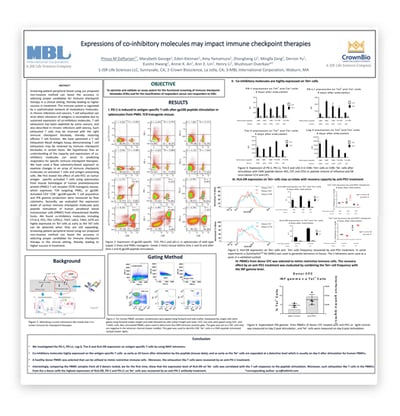AACR Poster 4124: Optimizing a Functional ICB Screening Assay System
Expression of Co-Inhibitory Molecules May Impact Immune Checkpoint Therapies
Pirouz Daftarian*, Marybeth George*, Eden Kleiman*, Amy Yamamura, Zhongliang Li, Mingfa Zang, Derron Yu, Eunmi Hwang, Annie X. An, Ann E. Lin, Henry Li, Wushouer Ouerkaxi#
*JSR Life Sciences LLC, Sunnyvale, CA; #MBL International Corporation, Woburn, MA
 T cell exhaustion arises when sustained expression of co-inhibitory molecules results in incomplete clearance of antigens. T cell exhaustion is exploited by some cancers, but exhausted T cells may be reversed with the right immune checkpoint blockade, thereby restoring effector T cell function.
T cell exhaustion arises when sustained expression of co-inhibitory molecules results in incomplete clearance of antigens. T cell exhaustion is exploited by some cancers, but exhausted T cells may be reversed with the right immune checkpoint blockade, thereby restoring effector T cell function.
Understanding the capacity and expression of co-inhibitory molecules can potentially help in predicting responders for specific immune checkpoint therapies. Screening patient peripheral blood using non-invasive methods could boost the accuracy of selecting the right candidates for clinical immune checkpoint therapy, therefore leading to improved treatment success.
This poster details the optimization and validation of an assay system for the functional screening of immune checkpoint blockades (ICBs) and for the classification of responders versus non-responders to ICBs.
Read this Poster to Discover:
- The investigation of PD-1, PD-L1, LAG-3, Tim-3, and HLA-DR expression on antigen specific T cells using MHC tetramers
- That expression levels of HLA-DR on Tet+ cells correlate with T cell response to peptide stimulation
- How exhaustion-like T cells in PBMCs from a donor with the highest HLA-DR, PD-1, and PD-L1 expression on Tet+ cells was recovered by anti-PD-1 antibody treatment
Download the Poster Now!

 T cell exhaustion arises when sustained expression of co-inhibitory molecules results in incomplete clearance of antigens. T cell exhaustion is exploited by some cancers, but exhausted T cells may be reversed with the right immune checkpoint blockade, thereby restoring effector T cell function.
T cell exhaustion arises when sustained expression of co-inhibitory molecules results in incomplete clearance of antigens. T cell exhaustion is exploited by some cancers, but exhausted T cells may be reversed with the right immune checkpoint blockade, thereby restoring effector T cell function.
